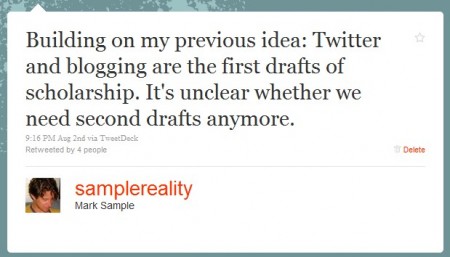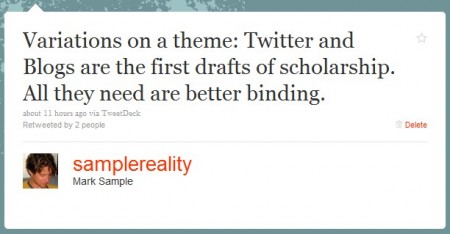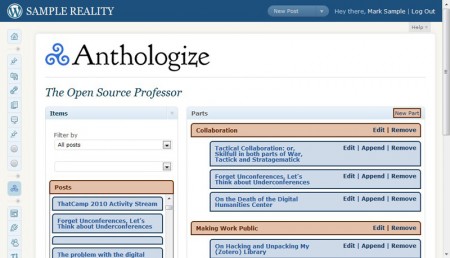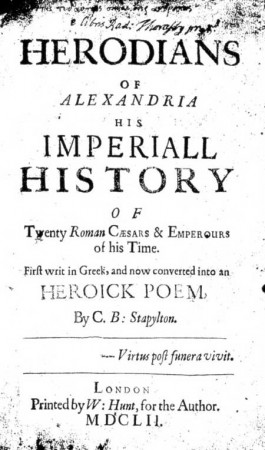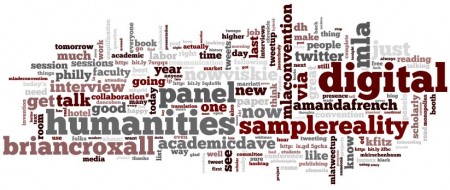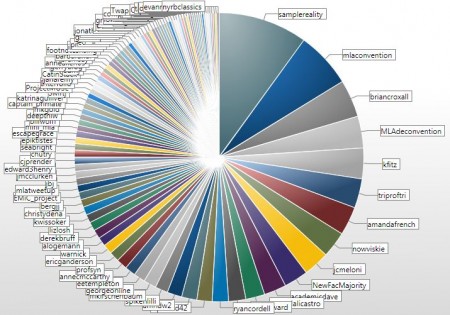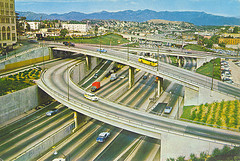 Revised: This is a comprehensive list of digital humanities sessions at the 2011 MLA in Los Angeles. Many of the speakers posted the text of their talks online, and you’ll find links here to those online versions. If yours isn’t linked yet, please reply in the comments with the URL of your presentation, and I’ll add it here for archival purposes.
Revised: This is a comprehensive list of digital humanities sessions at the 2011 MLA in Los Angeles. Many of the speakers posted the text of their talks online, and you’ll find links here to those online versions. If yours isn’t linked yet, please reply in the comments with the URL of your presentation, and I’ll add it here for archival purposes.
Thursday, 06 January
12. Labor in the Digital Humanities
12:00 noon–1:15 p.m., 407, LA Convention Center
Presiding: William Thompson, Western Illinois Univ.
Speakers: Mark Childs, Coventry Univ.; Tanya E. Clement, Univ. of Maryland, College Park; Kathleen Fitzpatrick, Pomona Coll.; Amanda L. French, George Mason Univ.; Carl Stahmer, Univ. of California, Santa Barbara
Members of this roundtable will address the professional and ethical issues raised by labor in and of the digital humanities. Questions open for discussion: the problem of authorship; the levels and kinds of recognition for contributions made to a project; issues regarding rights holding; problems raised by the differing institutional status of persons working on the same project; potential problems raised around distance education; and the complex questions raised by compensation, in the form of pay and in the form of accumulated symbolic capital.
For abstracts, visit http://fabtimes.net/citcafprrlabor/.
19. Digging into Data: Computational Methods of Literary Research
12:00 noon–1:15 p.m., Platinum Salon F, J. W. Marriott
Presiding: Maura Carey Ives, Texas A&M Univ., College Station
1. “The Dangers and Delights of Data Mining,” Glenn H. Roe, Univ. of Chicago
2. “The Meandering through Textuality Challenge: Perspectives on the Humane Archive,” Stephen J. Ramsay, Univ. of Nebraska, Lincoln
3. “Exploring the Underpinnings of the Social Edition,” Raymond G. Siemens, Univ. of Victoria
29. The Brave New World of Scholarly Books: Publishing in Tempestuous Times
12:00 noon–1:15 p.m., 410, LA Convention Center
Presiding: Alan Rauch, Univ. of North Carolina, Charlotte
Speakers: James J. Bono, Univ. at Buffalo, State Univ. of New York; Gregory M. Britton, Getty Publications; Jennifer Crewe, Columbia Univ. Press; Leslie Mitchner, Rutgers Univ. Press; Eric Zinner, New York Univ. Press
The current status of scholarly book publishing is confusing, troubling, and yet, from some perspectives, about to embrace a new and potentially exciting digital future. How can scholars who don’t have regular access to editors and publishers begin to sort this out? This roundtable opens up some of the questions inherent in the “crisis” in scholarly publishing and explores the very real changes, digital and fiscal, that are altering the world of scholarly books.
For online information and handouts, write to arauch@uncc.edu.
45. Getting Funded in the Humanities: A National Endowment for the Humanities (NEH) Workshop
1:30–3:30 p.m., 403B, LA Convention Center
Presiding: Brett Bobley, NEH; Rebecca Boggs, NEH; Sonia Feigenbaum, NEH
This workshop will highlight recent awards and outline current funding opportunities. In addition to emphasizing grant programs that support teaching, research, and public programs in the humanities, the workshop will include information on new developments, such as digital initiatives and Bridging Cultures. A question-and-answer period will follow.
48. Hacking the Profession: Academic Self-Help in an Age of Crisis
1:45–3:00 p.m., 407, LA Convention Center
Presiding: Jason B. Jones, Central Connecticut State Univ.
Speakers: Brian Croxall, Emory Univ.; Natalie M. Houston, Univ. of Houston; George H. Williams, Univ. of South Carolina, Spartanburg
This roundtable discusses how we narrate our academic lives online, whether in blogs or on Twitter, Facebook, YouTube, or in any other format. In particular, we are interested in how we talk about failure or, more gently, about the common problems that plague any academic life: the class that doesn’t quite work, the committee that’s driving us crazy, or the article that can’t quite find a home.
For background reading and preliminary discussion, visit www.profhacker.com after 1 Dec.
52. E-Books as Bibliographical Objects
1:45–3:00 p.m., Platinum Salon C, J. W. Marriott
Presiding: Matthew Gary Kirschenbaum, Univ. of Maryland, College Park
1. “The Enkindling Reciter: Performing Reading and Concealing Texts in the E-Book Demo,” Alan Galey, Univ. of Toronto
2. “Open Objects: From Book to Nook,” Andrew Piper, McGill Univ.
3. “The Kindle Advertiser: E-Books, Advertising, and the Evanescent Edition,” Zahr Said Stauffer, Univ. of Virginia
4. “Virtual Reading on Amazon.com,” Yung-Hsing Wu, Univ. of Louisiana, Lafayette
91. Meeting in the Library: Academic Labor at the Interface
3:30–4:45 p.m., 410, LA Convention Center
Presiding: Lauren Coats, Louisiana State Univ., Baton Rouge; Gabrielle Dean, Johns Hopkins Univ., MD
Speakers: Anne Bruder, Bryn Mawr Coll.; Lauren Coats; Gabrielle Dean; Patricia M. Hswe, Penn State Univ., University Park; Kevin Mulroy, Univ. of California, Los Angeles; Timothy L. Stinson, North Carolina State Univ.
This roundtable will show how practices of communication, cooperation, and exchange between the traditionally segregated roles of librarian and scholar can strengthen jobs, institutions, and knowledge production. Faculty members and librarians share at least two arenas of labor, both central to academia. First, scholars and librarians need to work together to shape the methods and forms of humanities research. Second, librarians and instructors must collaborate on curricula that help students navigate, analyze, and build pathways of knowledge. Focusing on these two issues, the roundtable will consider how the library can serve as the interface where collaboration occurs and where academic labor can be productively transformed.
125. Literary Research in/and Digital Humanities
3:30–4:45 p.m., Diamond Salon 1, J. W. Marriott
Program arranged by the Discussion Group on Libraries and Research in Languages and Literatures
Speakers: Heather Bowlby, Univ. of Virginia; Marija Dalbello, Rutgers Univ., New Brunswick; Amy Earhart, Texas A&M Univ., College Station; Manuel M. Martin-Rodriguez, Univ. of California, Merced; Susanne Woods, Wheaton Coll., MA; Abby Yochelson, Library of Congress
Respondent: Robert H. Kieft, Occidental Coll.
This session is the inaugural meeting of a new interdisciplinary MLA discussion group formed by librarians in the association for the discussion of matters of mutual interest with scholars. Panelists will present current work, and the group will discuss its future and how it can promote the creation and curation of scholarly collections and archives, publications, research data, and teaching and study tools through professional associations and on their own campuses.
For abstracts, visit http://guides.library.umass.edu/MLA2011.
140. What Is “College Level Writing” in the Twenty-First Century?
5:15–6:30 p.m., 410, LA Convention Center
Presiding: Les Perelman, Massachusetts Inst. of Tech.
1. “Local Values, Global Perspectives: College Writing at Hispanic-Serving Institutions,” Jolivette Mecenas, Univ. of La Verne
2. “Writing in the Era of the Shadow Elite: The Twilight of the Professions and the Rebirth of the Public Sphere,” Kurt Spellmeyer, Rutgers Univ., New Brunswick
3. “Negotiating College-Level Writing in New Media in the Writing Center,” Kate Pantelides, Univ. of South Florida
141. New Thresholds of Interpretation? Paratexts in the Digital Age
5:15–6:30 p.m., Platinum Salon F, J. W. Marriott
Presiding: Dorothee Birke, Freiburg Inst. for Advanced Studies
1. “Bootleg Paratextuality and Media Aesthetics: Decay and Distortion in the Borat DVD,” Paul Benzon, Temple Univ., Philadelphia
2. “The Amazon Phenomenon: New Contextual Paratexts of Historiographic Narratives,” Julia Lippert, Martin-Luther-Universität Halle-Wittenberg
3. “Peritexts and Epitexts in Transitional Electronic Literature: Readers and Paratextual Engagement on Kindles, iPods, and Netbooks,” Ellen M. McCracken, Univ. of California, Santa Barbara
150. New Tools, Hard Times: Social Networking and the Academic Crisis
5:15–6:30 p.m., 406A, LA Convention Center
Presiding: Meredith L. McGill, Rutgers Univ., New Brunswick
Speakers: Rosemary G. Feal, MLA
Marc Bousquet, Santa Clara Univ.
Brian Croxall, Emory Univ.
Christopher John Newfield, Univ. of California, Santa Barbara
Marilee Lindemann, Univ. of Maryland, College Park
This roundtable will examine what role the tools of social networking (e.g., blogs, Twitter, Facebook, and YouTube) have played in organizing and communicating about the economic crisis in higher education. One of the goals of the panel will be practical: to share tips and strategies about what works and what doesn’t (and to think critically about how we judge the effectiveness of any particular tool or strategy). Another will be reflective: to provide an opportunity for weighing the benefits and the risks of scholars using these tools to perform work that is often more in the mode of public or professional advocacy than scholarship in the traditional sense.
Friday, 07 January
185. Planet Wiki? Postcolonial Theory, Social Media, and Web 2.0
8:30–9:45 a.m., 406A, LA Convention Center
Presiding: Amit Ray, Rochester Inst. of Tech.
1. “Border Politics on YouTube: Heriberto Yépez’s ‘Voice Exchange Rates’ (or the Bodies That Antimatter),” Tomás Urayoán Noel, Univ. at Albany, State Univ. of New York
2. “Truths of Times to Come: Deleuze, Media, India,” Amitabh Rai, Florida State Univ.
3. “Remapping the Space In-Between: Social Networks of Race, Class, and Digital Media in the Brazilian City,” Justin Andrew Read, Univ. at Buffalo, State Univ. of New York
193. New (and Renewed) Work in Digital Literary Studies: An Electronic Roundtable
8:30–9:45 a.m., Plaza I, J. W. Marriott
Presiding: Bethany Nowviskie, Univ. of Virginia
Speakers: Ernest Cole, Hope Coll.; Randall Cream, Univ. of South Carolina, Columbia; Kathleen Fitzpatrick, Pomona Coll.; Joseph Gilbert, Univ. of Virginia; Laura C. Mandell, Miami Univ., Oxford; William Albert Pannapacker, Hope Coll.; Douglas Reside, Univ. of Maryland, College Park; Andrew M. Stauffer, Univ. of Virginia; John A. Walsh, Indiana Univ., Bloomington; Matthew Wilkens, Rice Univ.
Projects, groups, and initiatives highlighted in this session build on the editorial and archival roots of humanities scholarship to offer new, explicitly methodological and interpretive contributions to the digital literary scene or to intervene in established patterns of scholarly communication and pedagogical practice. Brief introductions will be followed by simultaneous demonstrations of the presenters’ work at eight computer stations.
For project links and abstracts, visit http://ach.org/mla/mla11/.
218. Analog and Digital: Texts, Contexts, and Networks
10:15–11:30 a.m., Atrium I, J. W. Marriott
Presiding: Victoria E. Szabo, Duke Univ.
1. “Digital Networks and Horizontal Textuality,” David S. Roh, Old Dominion Univ.
2. “The Work of the Text in Haggard’s She: Full-Text Searching and Networks of Association,” Robert Steele, George Washington Univ.
3. “Taken Possession Of: What Digital Archives Can Teach Us about Nathaniel Hawthorne, Religious Readers, and Antebellum Reprinting Culture,” Ryan C. Cordell, Univ. of Virginia
For abstracts, visit www.duke.edu/~ves4/mla2011.
233. Transmedia Activism
10:15–11:30 a.m., Diamond Salon 6, J. W. Marriott
Presiding: Anna Everett, Univ. of California, Santa Barbara
Speakers: Anne Balsamo, Univ. of Southern California; Ben Caldwell, Los Angeles, CA; Radhika Gajjala, Bowling Green State Univ.; Henry Jenkins, Univ. of Southern California; Toby Miller, Univ. of California, Riverside
This roundtable considers how transmedia practices advance activism around matters of social justice, critical literacy, and responsible artistic expressions. All the panelists are involved in current media activism and pedagogy projects.
235. Old Media
10:15–11:30 a.m., Olympic III, J. W. Marriott
Presiding: Kate Flint, Rutgers Univ., New Brunswick
1. “(Post)Imperial Media,” Aaron S. Worth, Boston Univ.
2. “Hieroglyphics and the Writing/Media Divide,” Jesse Schotter, Yale Univ.
3. “Aldous Huxley and the Hazards of Writing Technologies,” Emily James, Univ. of Washington, Seattle
4. “The Tachistoscope and Digital Literature,” Jessica Pressman, Yale Univ.
248. The Dictionary in Print and in the Cloud
12:00 noon–1:15 p.m., Olympic I, J. W. Marriott
Presiding: Michael Hancher, Univ. of Minnesota, Twin Cities
Speakers: Tim Cassedy, New York Univ.; David L. Porter, Univ. of Michigan, Ann Arbor; Glenn H. Roe, Univ. of Chicago; Robert Steele, George Washington Univ. For abstracts, visit http://mh.cla.umn.edu/MLA.pdf.
282. Paper as Platform or Interface
12:00 noon–1:15 p.m., Olympic III, J. W. Marriott
Presiding: Lisa Gitelman, New York Univ.
1. “The Word Made Flax: Cheap Bibles, Textual Corruption, and the Poetics of Paper,” Joshua Calhoun, Univ. of Delaware, Newark
2. “The Theory of Paper: Hume, Beattie, Derrida,” Christina Lupton, Univ. of Michigan, Ann Arbor
3. “The Wordsworths’ Daffodils: On the Page, upon the Inward Eye,” Richard Menke, Univ. of Georgia
296. Technology-Enhanced Delivery Models in Foreign Language Learning and Teaching
1:45–3:00 p.m., Platinum Salon A, J. W. Marriott
Presiding: Fernando Rubio, Univ. of Utah; Joshua Thoms, Louisiana State Univ., Baton Rouge
1. “Options in Instructional Modeling: Meeting the Demand for Spanish in Demanding Times,” Diane Musumeci, Univ. of Illinois, Urbana
2. “What CALL (Computer-Assisted Language Learning) Offers for the L2 Curriculum,” Robert James Blake, Univ. of California, Davis
For abstracts, visit www.aausc.org/Default.aspx?pageId=236781.
305. Silent Night: The Archives of the Deaf and Blind
1:45–3:00 p.m., Atrium I, J. W. Marriott
Presiding: Marta L. Werner, D’Youville Coll.
1. “Entering the Light: Deaf Studies Digital Journal and the Archives of Sign Language Poetics,” H-Dirksen Bauman, Gallaudet Univ.
2. “Blindness and Exile in the ‘Dark Blue World’ of Jaroslav Jezek,” Michael Beckerman, New York Univ.
3. “Accessioning Helen Keller: Disability, History, and the Politics of the Archive,” David Serlin, Univ. of California, San Diego
309. The History and Future of the Digital Humanities
1:45–3:00 p.m., Plaza I, J. W. Marriott
Presiding: Kathleen Fitzpatrick, Pomona Coll.
Speakers: Brett Bobley, NEH; Katherine D. Harris, San José State Univ.; Alan Liu, Univ. of California, Santa Barbara; Tara McPherson, Univ. of Southern California; Bethany Nowviskie, Univ. of Virginia; Stephen J. Ramsay, Univ. of Nebraska, Lincoln; Susana Ruiz, Univ. of Southern California
This roundtable will bring together many different perspectives, from humanities computing to digital media studies, including senior and junior scholars, research and teaching institutions, and faculty and staff members, so that we might explore the overlap, diffusion, and multiplicity of views of the digital humanities that result.
331. The Open Professoriat: Public Intellectuals on the Social Web
3:30–4:45 p.m., Plaza I, J. W. Marriott
Presiding: Matthew K. Gold, New York City Coll. of Tech., City Univ. of New York
Speakers: Samuel Cohen, Univ. of Missouri, Columbia; Amanda L. French, George Mason Univ. on Open Source and Readership; David Parry, Univ. of Texas, Dallas; Mark L. Sample, George Mason Univ. on Tactical Collaboration; Erin Templeton, Converse Coll. on Public Intellectuals and the Social Web; Elizabeth Vincelette, Old Dominion Univ.
This panel will explore the range of possibilities surrounding the use of social media in many aspects of academic life, with particular attention to the ways in which they can help broaden the audience for academic work at a time of economic and institutional crisis in the academy.
349. From N-Town to YouTube: Medieval Drama on Film, Video, and the Web
3:30–4:45 p.m., 306A, LA Convention Center
Presiding: Victor Ivan Scherb, Univ. of Texas, Tyler
1. “Queer Desire in the York Cycle and the York Festival Trust Plays,” Mary Hayes, Univ. of Mississippi
2. “Page to Stage: Film Footage and the Teaching of Medieval Drama,” Maren Clegg Hyer, Valdosta State Univ.
3. “Making a Magnyfycent Film: Representing Medieval Drama in a Digital Age,” Maria Sachiko Cecire, Bard Coll.
For abstracts, visit http://mrds.eserver.org/.
385. Endangered Languages, Language Documentation, and Digital Humanities
5:15–6:30 p.m., 404A, LA Convention Center
Presiding: Marnie Jo Petray, California Polytechnic State Univ., San Luis Obispo
1. “Predicting the Syntactic Complexity of Newly Recognized Yipho-Ngwi Languages,” Eric Drewry, Azusa Pacific Univ.
2. “Eliciting Phonetic Data in the Field for Language Documentation,” Seunghun J. Lee, Central Connecticut State Univ.
3. “From Data Collection to Data Organization: A Brief Overview of the Challenges of Doing Fieldwork in Linguistics,” Jose Alberto Elias-Ulloa, Stony Brook Univ., State Univ. of New York
For abstracts, write to leeseu@ccsu.edu.
397. The Lives That Digital Archives Write
5:15–6:30 p.m., Plaza I, J. W. Marriott
Presiding: Ruth E. Mack, Univ. at Buffalo, State Univ. of New York
1. “Social Networking in the Enlightenment,” Dan M. Edelstein, Stanford Univ.
2. “Working Lives from Digital Sources: London 1690–1800,” Tim Hitchcock, Univ. of Hertfordshire; Robert Shoemaker, Univ. of Sheffield
3. “Mapping the Social Text: Topography, Letters, and Alexander Pope,” Allison Muri, Univ. of Saskatchewan
Saturday, 08 January
431. Textual Scholarship and New Media
8:30–9:45 a.m., Diamond Salon 8, J. W. Marriott
Presiding: Michael Eberle-Sinatra, Université de Montréal
1. “Comic Book Markup Language: An Introduction and Rationale,” John A. Walsh, Indiana Univ., Bloomington
2. “Crowdspeak: Mobile Telephony and TXTual Practice,” Rita Raley, Univ. of California, Santa Barbara
3. “Alternate Reality Games and Transmedia Textuality: Interpretive Play and the Immaterial Archive,” Zach Whalen, Univ. of Mary Washington
436. The Institution(alization) of Digital Humanities
8:30–9:45 a.m., Atrium III, J. W. Marriott
Presiding: David Lee Gants, Florida State Univ.
1. “A Media Ecological Approach to Digital Humanities; or, How I Learned to Stop Worrying and Love This Dynamic Field,” Kimberly Knight, Univ. of Texas, Dallas
2. “Power, Prestige, and Profession: Digital Humanities in the Age of Academic Anxiety,” Amy Earhart, Texas A&M Univ., College Station
3. “Emerging Dialogue: Librarians and Digital Humanists,” Johanna Drucker, Univ. of California, Los Angeles
462. Foreign Language Cultural Literacy and Web 2.0
10:15–11:30 a.m., 304C, LA Convention Center
Presiding: Charlotte Ann Melin, Univ. of Minnesota, Twin Cities
1. “Translingual and Transcultural Hospitality: On Derridean Dilemmas of Pedagogy and Digital Practices, and Some Solutions,” Glenn S. Levine, Univ. of California, Irvine
2. “The Stanford Nonnative Rapper Contest: Showcasing Transcultural Competences Using Collaborative Social Media Frameworks,” Joseph Kautz, Stanford Univ.; Per Urlaub, Univ. of Texas, Austin
3. “In the Favela with Web 2.0: A Collaborative Web-Based Language and Culture Exchange Project,” Evan Rubin, San Diego State Univ.
474. Social Networking: Web 2.0 Applications for the Teaching of Languages and Literatures
10:15–11:30 a.m., Diamond Salon 2, J. W. Marriott
Presiding: Barbara Lafford, Arizona State Univ. West
1. “Writing for Nonprofits in Social-Media Environments,” Sean McCarthy, Univ. of Texas, Austin
2. “The Macaulay Eportfolio Collection: A Case Study in the Uses of Social Networking for Learning,” Lauren Klein, Graduate Center, City Univ. of New York
3. “Social Media, Digital Vernaculars, and Language Education,” Steven Thorne, Portland State Univ.
For abstracts, write to blafford@asu.edu.
493. The Archive and the Aesthetic: Methodologies of American Literary Studies
10:15–11:30 a.m., Diamond Salon 8, J. W. Marriott
Presiding: Elizabeth Maddock Dillon, Northeastern Univ.
1. “Archive Anxieties and Print Culture,” Nancy Glazener, Univ. of Pittsburgh
2. “The New New Historicism: Electronic Archives and Aesthetic Judgment,” Maurice Sherwood Lee, Boston Univ.
3. “Historical Oversights: Ambivalence and Judgment in the Age of Archival Reproducibility,” John Funchion, Univ. of Miami
505. Lives and Archives in Graphic and Digital Modes
12:00 noon–1:15 p.m., Platinum Salon C, J. W. Marriott
Presiding: Julia Watson, Ohio State Univ., Columbus
1. “Comics Form and Narrating Lives,” Hillary L. Chute, Harvard Univ.
2. “Automedial Ghosts,” Brian Rotman, Ohio State Univ., Columbus
3. “What Is Worth Saving? The Salvage Work of Comics,” Theresa Tensuan, Haverford Coll.
521. Close Reading the Digital
12:00 noon–1:15 p.m., Atrium I, J. W. Marriott
Presiding: Jeremy Douglass, Univ. of California, San Diego
1. “The Code of Hacktavism: A Critical Code Study Case Study,” Mark Marino, Univ. of Southern California
2. “Close Reading Campaign Rhetorics: Procedurality and MyBarackObama.com,” James J. Brown, Wayne State Univ.
3. “Criminal Code: The Procedural Logic of Crime in Video Games,” Mark L. Sample, George Mason Univ.
Respondent: Matthew Gary Kirschenbaum, Univ. of Maryland, College Park
For abstracts, visit http://criticalcodestudies.com/mla2011 after 1 Dec.
532. Electronic Lives
12:00 noon–1:15 p.m., Plaza III, J. W. Marriott
Presiding: Alison Booth, Univ. of Virginia
1. “Autotweetography: Producing and Consuming Identity on Social-Network Sites,” Laurie McNeill, Univ. of British Columbia
2. “Invisible Syndromes: Virtual Biomedical Communities, Self-Monitoring, and Narratives of the Self,” Olivia Banner, Rice Univ.
3. “The Child as Pornographer,” Ellis Hanson, Cornell Univ.
541. Electronic Literature: Off the Screen
1:45–3:00 p.m., Plaza II, J. W. Marriott
Presiding: Jessica Pressman, Yale Univ.
1. “A Pixel or a Grain of Sand: Jenny Holzer’s Projections,” Leisha J. Jones, Penn State Univ., University Park
2. “Locative Narrative: Reorganizing Space in Mobile E-Literature,” Mark Marino, Univ. of Southern California
3. “E-Literature as Event: Seeing Space and Time in Kinetic Typography,” Jeremy Douglass, Univ. of California, San Diego
For abstracts, write to jessica.pressman@yale.edu.
577. Print Culture and Undergraduate Literary Study
1:45–3:00 p.m., Platinum Salon A, J. W. Marriott
Presiding: Lisa Gitelman, New York Univ.
1. “Using Early English Books Online in the Undergraduate Classroom,” Joanne Diaz, Illinois Wesleyan Univ.
2. “Benjamin Franklin’s Compositions,” Jonathan Senchyne, Cornell Univ.
3. “Not Necessarily Natives: Teaching Digital Media with Book Technology (and Vice Versa),” Lisa Marie Maruca, Wayne State Univ.
Respondent: David Lee Gants, Florida State Univ.
For abstracts, visit www.sharpweb.org/ after 15 Dec.
596. Will Publications Perish? The Paradigm Shift in Scholarly Communication
3:30–4:45 p.m., Plaza I, J. W. Marriott
Presiding: Alan Rauch, Univ. of North Carolina, Charlotte
Speakers: Cheryl E. Ball, Illinois State Univ.; Leslie Kreiner Wilson, Pepperdine Univ.; Laurence D. Roth, Susquehanna Univ.; Andrew M. Stauffer, Univ. of Virginia
The scholarly essay, once the coin of the realm in academia, is being transformed by digital technologies. Questions about the future viability of learned journals, to say nothing of practices such as peer review, confront us all. This session is an effort to deal with those questions directly and initiate a dialogue about how various branches of the scholarly community can respond to ongoing and inevitable challenges.
For talking points, visit www.alanrauch.com/perish.html.
606. Methods of Research in New Media
3:30–4:45 p.m., Platinum Salon J, J. W. Marriott
Presiding: Maura Carey Ives, Texas A&M Univ., College Station
1. “Be Online or Be Irrelevant,” David Parry, Univ. of Texas, Dallas
2. “Applied Media Theory: Where Digital Art Meets Humanities Research,” Marcel O’Gorman, Univ. of Waterloo
3. “Augmenting Fiction: Storytelling, Locative Media, and the New Media Lab,” Carolyn Guertin, Univ. of Texas, Arlington
617. Implementing New Knowledge Environments (INKE) and the Scholarly Edition
5:15–6:30 p.m., Diamond Salon 8, J. W. Marriott
Presiding: Paul Werstine, Univ. of Western Ontario
Speakers: Michael Choi, Univ. of Western Ontario; Stan Ruecker, Univ. of Alberta; Raymond G. Siemens, Univ. of Victoria
Topics for discussion will include bringing architectures of the book into the digital age, introducing the dynamic table of contexts for the online scholarly edition, and supporting the scholarly edition in electronic form.
619. Ecocriticism beyond Literature
5:15–6:30 p.m., 410, LA Convention Center
Presiding: Allison Carruth, Univ. of Oregon
1. “Postcolonial Ecologies: Alterity and the Genealogies of Ecocriticism,” Elizabeth M. DeLoughrey, Univ. of California, Los Angeles
2. “Ecocriticism and the Database Aesthetic,” Ursula K. Heise, Stanford Univ.
3. “Out of Our Depths: Oceanic Challenges to Environmental Theory and Animal Studies,” Stacy Alaimo, Univ. of Texas, Arlington
4. “Computer-Aided Design and the Future Green City,” Allison Carruth
For abstracts, visit www.uoregon.edu/~acarruth/ after 2 Jan.
639. Where’s the Pedagogy in Digital Pedagogy?
5:15–6:30 p.m., Platinum Salon F, J. W. Marriott
Presiding: Nirmal H. Trivedi, Georgia Inst. of Tech.
Speakers: Danielle Barrios, Univ. of Ulster; Kristine Blair, Bowling Green State Univ.; Joy Bracewell, Univ. of Georgia; Andrew Famiglietti, Georgia Inst. of Tech.; Antero Garcia, Univ. of California, Los Angeles; Jill Marie Parrott, Univ. of Georgia; Christine Tulley, Univ. of Findlay
This session will share the great number of practical and philosophical questions surrounding what it means to “teach digitally” today. We want to focus attention away from “toolism”—a preoccupation with new technologies for the sake of newness and technical power—and direct attention toward the pedagogy that technology and collaboration can unveil.
For abstracts, write to nirmal.trivedi@lcc.gatech.edu.
THATCamp LA Gathering
8:00-10 p.m., Olympic 1, J.W. Marriott
Sunday, 09 January
743. What the Digital Does to Reading
10:15–11:30 a.m., Diamond Salon 8, J. W. Marriott
Presiding: Laura C. Mandell, Miami Univ., Oxford
1. “What Would Jesus Google? Plural Reading in the Digital Archive,” Daniel Allen Shore, Grinnell Coll.
2. “Social Book Catalogs and Reading: Shifting Paradigms, Humanizing Databases,” Renee Hudson, Univ. of California, Los Angeles; Kimberly Knight, Univ. of Texas, Dallas
3. “Illuminating Hidden Paths: Reading and Annotating Texts in Many Dimensions,” Julie Meloni, Washington State Univ., Pullman
For abstracts, visit www.users.muohio.edu/mandellc/digRdg.html after 15 Nov.
752. Literature and/as New Media
12:00 noon–1:15 p.m., 309, LA Convention Center
Presiding: Jon McKenzie, Univ. of Wisconsin, Madison
Speakers: Sarah Allison, Stanford Univ.; N. Katherine Hayles, Duke Univ.; Richard E. Miller, Rutgers Univ., New Brunswick; Todd Samuel Presner, Univ. of California, Los Angeles; Craig J. Saper, Univ. of Central Florida; Holly Willis, Univ. of Southern California; Michael L. Witmore, Univ. of Wisconsin, Madison
This session engages the nexus of literature and new media from several perspectives, ranging from emerging forms of electronic literature to computer-enabled modes of literary analysis to the broader implications of IT and new media for literary and cultural study. In an age of digital poetry, graphic novels, and iPhone “appisodes,” how useful is the notion of distinct media? In what ways do quantitative methods of “distant reading” and “counting literature” extend traditional forms of analysis, and in what ways do they threaten or simply sidestep them? And what’s at stake in recent calls to critically mash up new media forms and processes in order to reboot the humanities as “new humanities,” “Big Humanities,” and “Humanities 2.0”?
753. Sustainable Publishing
12:00 noon–1:15 p.m., Plaza III, J. W. Marriott
Presiding: Uppinder Mehan, Univ. of Houston, Victoria
1. “New Stationary States,” Brian Lennon, Penn State Univ., University Park
2. “Sustainable Publishing: The Dead-End of the Print/Digital Binary,” Robert Philip Marzec, Purdue Univ., West Lafayette
3. “The Publishing Junkyard,” Jeffrey R. Di Leo, Univ. of Houston, Victoria
For papers, visit http://societyforcriticalexchange.org.
792. Sound Reproduction and the Literary
1:45–3:00 p.m., Diamond Salon 6, J. W. Marriott
Presiding: Jentery Sayers, Univ. of Washington, Seattle
1. “Sound as Sensory Modality in Electronic Literature,” Dene M. Grigar, Washington State Univ., Vancouver
2. “‘Cause That’s the Way the World Turns’: John Edgar Wideman’s Sent for You Yesterday and the Mnemonic Jukebox,” Jürgen E. Grandt, Gainesville State Coll., GA
3. “Analog History: Kevin Young’s To Repel Ghosts and the Textuality of the Turntable,” Paul Benzon, Temple Univ., Philadelphia
For abstracts, examples, and biographies, visit www.hastac.org/ after 1 Dec.
Following the MLA Conference
January 11-12 at Chapman University in Orange, California
